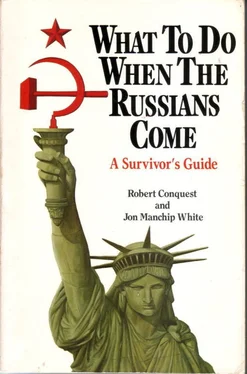Robert Conquest - What to Do When the Russians Come
Здесь есть возможность читать онлайн «Robert Conquest - What to Do When the Russians Come» весь текст электронной книги совершенно бесплатно (целиком полную версию без сокращений). В некоторых случаях можно слушать аудио, скачать через торрент в формате fb2 и присутствует краткое содержание. Город: New York, Год выпуска: 1984, ISBN: 1984, Издательство: Stein and Day Inc., Жанр: Публицистика, на английском языке. Описание произведения, (предисловие) а так же отзывы посетителей доступны на портале библиотеки ЛибКат.
- Название:What to Do When the Russians Come
- Автор:
- Издательство:Stein and Day Inc.
- Жанр:
- Год:1984
- Город:New York
- ISBN:0-8128-2985-9
- Рейтинг книги:3 / 5. Голосов: 1
-
Избранное:Добавить в избранное
- Отзывы:
-
Ваша оценка:
- 60
- 1
- 2
- 3
- 4
- 5
What to Do When the Russians Come: краткое содержание, описание и аннотация
Предлагаем к чтению аннотацию, описание, краткое содержание или предисловие (зависит от того, что написал сам автор книги «What to Do When the Russians Come»). Если вы не нашли необходимую информацию о книге — напишите в комментариях, мы постараемся отыскать её.
What to Do When the Russians Come — читать онлайн бесплатно полную книгу (весь текст) целиком
Ниже представлен текст книги, разбитый по страницам. Система сохранения места последней прочитанной страницы, позволяет с удобством читать онлайн бесплатно книгу «What to Do When the Russians Come», без необходимости каждый раз заново искать на чём Вы остановились. Поставьте закладку, и сможете в любой момент перейти на страницу, на которой закончили чтение.
Интервал:
Закладка:
All stores will fall under occupation management as soon as [things] are more or less stabilized. Minor businesses will be supervised [by] official controllers and will require the use of permits for all obtained or sold. Only later will they be formally nationalized and put beneath the umbrella of a new Department of Internal Trade.
Such a vista of businesses that have been wrecked or shut down, or that are functioning only at a fraction of capacity, will [be] somber enough for managers and employees; but it will bear even more heavily on you in your capacity as consumer. So let us [look] at some aspects of the Occupation as they affect you in this most and practical guise.
It is not only privation as such that you will suffer.
Many countries in times of crisis or war have seen their citizens willingly abandon higher standards of living for the national cause. The weekly meat ration in Britain in the 1940s was about the size of a man’s thumb and forefinger. American citizens, although not to such a degree, also accepted rationing and shortages and would have been willing to accept far worse if the circumstances had required it.
This time, it will not only be the case that the privations are the result of national humiliation; that much of what you fail to receive, even in basic foodstuffs, will be exported; that an alien-affiliated ruling elite will have far larger rations. What will stick in your throat even more is having every privation you or your family suffer inflicted on you by the decree of those you hate and despise and not even being permitted to grumble about it.
To begin with, the circumstances of the Russian takeover will lead to rigorous rationing. This will continue even after basic foodstuffs cease to be in short supply. Your family will spend a large portion of their time and energies in going around the stores, trying to discover where food and clothing and other necessities are available.
At present, about a third to a half of American women have jobs, but under the Occupation, the number of American women who work will rise until virtually all of them are employed except the very old or the very young—and even a good many of these. Otherwise it will simply not be possible for their families to reach even the minimal prevailing standards of life. Even so, the family food intake will decrease dramatically.
Life, as we have said, will be exceptionally burdensome for many women whose husbands have been arrested. They will often follow them into the camps, their children being taken by the State or boarded out with relatives who are willing and able to have them, as indicated in the last chapter. In the meantime, however, such women will lose their jobs, although they may be able to scrape along by obtaining menial and part-time employment as street cleaners or manual laborers on building sites. Many will beg or scavenge, activities that will be prohibited by the State but that will be so widespread that they will have to be winked at. An additional trial for a woman in this position is that her relatives and friends, to save their own skins, will be forced to shun her and cease to maintain a relationship with her.
But even the ordinary housewife, out shopping, will concentrate on locating supplies of bread and potatoes, which will be the main staples. Meat may be obtained for about one meal a week, if then. Stores will close when their supplies run out and will be virtually mobbed when their doors open. Lines, in which the mood will tend toward a bad temper, will be obligatory not just inside the stores but will commonly stretch along the sidewalk outside and around the corner of the block. Busy mothers will be able to hire the services of elderly people who can earn a few pennies by making a profession of standing or sitting in line as substitutes until the shopper who pays them can get there. Both wives and husbands would also be well-advised to always carry with them a string bag in case they hear of some necessary foodstuff or useful commodity becoming unexpectedly available.
You will not be choosy in the way you shop, and you will take everything on offer. There will not be much of a selection, particularly after present stocks are gone. Normally only one type of soap, stockings, razor and so on will be available. What selection there is will often tend to have an eccentric character. One month the stores will be overflowing with pickled gherkins from Poland or stuffed peppers from East Germany or whatever else the Soviet Union and its partners are dumping on you. Whether or not you and your family are partial to gherkins and peppers, buy them. You may find an imaginative way to serve them up or sell or exchange them with people who like them. It is always a mistake in any Communist country to turn up your nose at any food that happens to be going. The rule is: stock up. And if by any chance you lay your hands on something extra good, keep it for a birthday, an anniversary, a special occasion. It will give you something to look forward to, something memorable to interrupt the wearisome procession of the days.
Above all, make sure you keep your family as well provided as possible with warm clothing. A constant feature of your daily life will be the breakdown of power supplies and other public services. Even when they are restored, fuel shortages and the deterioration of equipment, together with administrative inefficiency, will result in chronic cuts in electricity, gas, and oil, with a ban on all but “essential” uses in the home and elsewhere. Your first winters are liable to be particularly miserable. Central heating, like air-conditioning, will be a thing of the past, except in the districts commandeered by the elite. You would do well to invest in a Swedish-type wood-burning stove and get used to cooking on a Primus stove or some other cooker that works on solid fuel. If you live in the city, it will help you greatly if you have friends or relatives in the country who can help secure you odd items of food. This will depend, of course, on whether the farmers themselves have been left by their overseers with any surplus, or have been clever enough to conceal it. Country friends may also help with good firewood. (In the cities in wintertime, you will notice that the benches, bushes, branches of trees, and even whole trees will mysteriously vanish from the public parks.)
If you live in the suburbs, your lawns and flowerbeds will largely relapse into a natural state since you won’t have the time, energy, or gasoline to mow and to tend them, although you may keep a few strips shorn with a hand mower or shears. If you are very lucky, and so situated, it might be possible to use the grass more profitably by keeping chickens and, perhaps, a pig—if you can spare the scraps from your kitchen for nonhuman consumption and can get permission for such activity, as may be the case if you are prepared to let the official concerned have a share of the by-product. All such livestock will even then have to be guarded continuously from sneak thieves and bands of marauders, and this will almost certainly prove very difficult to do. You should consider the risks. For example, it may be possible to keep the pig indoors at night and well watched by day; and neighbors in the same position may collaborate.
You may also be able to grow a few vegetables, although these too will need protection. Fruit trees, if you had them, are likely to have been cut down. But berry bushes of various types may survive and be an invaluable source of vitamins.
You will no longer have a deep freeze and seldom even a refrigerator in working order, but you can bottle or dry out your fruits and vegetables and add them to your store cupboard.
When it comes to purchases, do not rely on food that needs refrigerating since, even if your refrigerator works, the electricity supply will be unreliable, at any rate for some time. Tins and dried foods will be best, as well as being more easily hidden or disguised, and take up less space. But you might explore the possibility of getting hold of one of the old-fashioned iceboxes, which could in the end prove more serviceable and durable than the modern kind.
Читать дальшеИнтервал:
Закладка:
Похожие книги на «What to Do When the Russians Come»
Представляем Вашему вниманию похожие книги на «What to Do When the Russians Come» списком для выбора. Мы отобрали схожую по названию и смыслу литературу в надежде предоставить читателям больше вариантов отыскать новые, интересные, ещё непрочитанные произведения.
Обсуждение, отзывы о книге «What to Do When the Russians Come» и просто собственные мнения читателей. Оставьте ваши комментарии, напишите, что Вы думаете о произведении, его смысле или главных героях. Укажите что конкретно понравилось, а что нет, и почему Вы так считаете.












